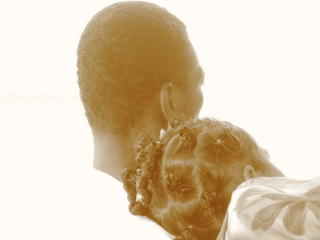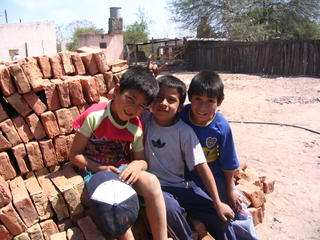I can't promise this will be the last of posts relating to Argetina, but I'll try not to get too boring. Here is something I wrote for the school paper about Argentine life:
You wake up as the sun rises and the roosters crow. The smell of fresh bread excites your stomach as you open the door to the streets of Campo Gallo, Argentina. Although this would be a good time to take a deep breath in and sigh, if you did so, the dust in the air would force you to cough up more dirt than you have the energy for right now.
You greet your mom with two kisses on the cheek and tell her you aren’t going to school today. Everything here is relaxed, even the concept of education. She doesn’t yell at you for not going; she never went to school and she is no lower on the poverty line than those who were educated.
Your younger brother is wearing the shirt you wore yesterday, so you find one of his t-shirts – there are no possessive pronouns in this town. Since you aren’t going to school, your mom tells you to buy some bread for breakfast. This morning, you don’t feel like walking farther than two feet, so you ask your neighbor if you can borrow his bike. Of course you can.
Your siblings head off to school never questioning why you aren’t going with them. This is normal village life. You help your mom clean the house and cook for lunch. Off to the bread store again for lunch rolls. Everything here is made fresh.
Everyone returns from school, businesses close down for a few hours and lunch is served. While the kids run around in the streets playing soccer, the men sit in a circle and sip their famous Argentine tea, mate, from a thick silver straw in a small silver-coated wooden mug. It looks like an Indian peace offering as each man takes a sip and passes it to his neighbor. Your mom and her friends are there to refill the cup.
It’s nap time. The whole town is quiet and every bed is occupied.
Late afternoon approaches and you head to the center of town. Bicycles line the plaza as if the roads were made from them. Here you find your grandpa and your girlfriend, not together, of course. The old men sit on the benches in the back, left corner, while the teenagers normally occupy the front and center where the statue of some war hero stands. The plaza is never empty, a whole lot of chatter takes place here: who likes whom; mom, I want some ice cream; back when we were younger...
In a place where a piece of fabric suits just fine as a door and windows are holes in the wall, entertainment here must be cheap or, better yet, free. So you play soccer on the grassless land with a flat ball. You surf the internet with friends at the cafe, the one place you’ll find computers in this town. At home, you blast your music to feel the rhythm. This is good entertainment. And here, noise is not a social disturbance; it is a way of life.
As night approaches, the plaza fills up with teenagers as the adults and children trickle out. You and your girlfriend take a romantic stroll through the dimly lit, dusty roads around the plaza.
This is your life’s routine. If it satisfies you, you will wake up tomorrow and do the same thing.
But if you rebel, if you want more or find no nourishment in this lifestyle, you will seek a way out. Rich in social gatherings but poor in economic standing, this town doesn’t offer you many options. The big city of Buenos Aires is a 12-hour bus ride away. But for most, it’s OK that your brother’s shoes have holes in them, it’s OK that you wear the same t-shirts every week. It’s OK that you fight the same battles and see the same results. Change is a dream, and sleep here comes twice a day. So you can dream all you want.




